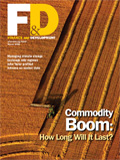
Archive of F&D Issues
Do you subscribe to the hard copy of F&D?

Please fill in this pdf survey
|
|

Subscription Information

Subscription Application Form
(pdf, 420 Kb)

About F&D

Copyright Information

Use the free Adobe Acrobat Reader to view pdf files
Free Email Notification
Receive emails when we post new
items of interest to you.
Subscribe or
Modify your profile

|

|

|

|

A quarterly magazine of the IMF |
|
March 2008
Volume 45,
Number 1 |
Commodity Boom: How Long Will It Last?

Riding a Wave
Thomas Helbling, Valerie Mercer-Blackman, and Kevin Cheng
Consumers and commodity importers have begun to feel the pinch from higher commodity prices, with widespread concern about the impact on the poor in emerging and developing economies. The current commodity price boom may have a lasting impact.
(920 kb, pdf file)
Climate Change and the Economy
Natalia Tamirisa
Climate change can be addressed without either hurting macroeconomic stability and growth or putting an undue burden on the countries least able to bear the costs of policies. If policies are well designed, their economic costs should be manageable.
(300 kb, pdf file)
Global Warming and Agriculture
William R. Cline
If steps are not taken to curb carbon emissions, agricultural productivity could fall dramatically, especially in developing countries. It is therefore strongly in these countries' own interest that they participate actively in international emissions abatement programs.
(2050 kb, pdf file)
Paying for Climate Change
Benjamin Jones, Michael Keen, and Jon Strand
Governments must manage the incentives for households and firms to counter and adapt to climate change. The role of fiscal instruments is central—indeed, indispensable—for both mitigating and adapting to climate change.
(216 kb, pdf file)
|
 |

The Greening of Markets
Paul Mills
Recognizing how financial markets will react to climate change initiatives, and how they can best promote mitigation and adaptation, will become crucial to shaping future policy and minimizing its costs.
(288 kb, pdf file)
Rising Temperatures, Rising Risks
Mohan Munasinghe
Although climate change and sustainable development are complex, interlinked problems that pose a challenge to humanity, they could be solved together by integrating adaptation and mitigation response measures into the broader rubric of sustainable development strategies.
(288 kb, pdf file)
Also in This Issue

Africa's Burgeoning Ties With China
Jian-Ye Wang and Abdoulaye Bio-Tchan�
At the same time that Africa has a responsibility to maximize the benefits of its economic relationship with China and other nations, China has an important role to play in ensuring that its economic partnership with African countries is mutually beneficial.
(244 kb, pdf file)
Jobs on Another Shore
David T. Coe
Outsourcing of service jobs to other countries could affect industrial countries' economies and attitudes toward globalization. The ongoing integration of China and India into the world economy is likely to have lasting effects on the distribution of income and on job security in advanced economies.
(208 kb, pdf file)
|
Departments

Letter from the Editor
(76 kb, pdf file)
Letters to the Editor
The SARS story; Failed “scheme”; Lax regulation in subprime crisis; Oil trade and the WTO.
(160 kb, pdf file)
In Brief
Measuring risks of emerging market public debt; Experts designate 2008 the year of the coral reef; Mangrove losses destroy important ecosystems; Children recruited to fight in armed conflicts; Global foreign direct investment reaches new high.
(72 kb, pdf file)
People in Economics

The Quest for Rules
Prakash Loungani profiles John Taylor, the academic and policymaker who originated the Taylor rule in 1992—a simple equation that described the response of the U.S. Federal Reserve’s interest rate target to inflation and business cycles, and gained wide acceptance among central banks as a useful guide for policy.
(156 kb, pdf file)
Picture This

Global Energy: Increasingly Unsustainable
Lorcan Lyons
A chart-based look at energy supply and consumption worldwide. If governments do not act to change consumption patterns, world energy demand is projected to grow by 55 percent during 2005–30.
(644 kb, pdf file)
Back to Basics

Exchange Rate Regimes: Fix or Float?
Mark Stone, Harald Anderson, and Romain Veyrune
The exchange rate regime has a major impact on world trade and financial flows. This article uses the widely used language and terminology developed by the IMF to classify countries' exchange rate regimes—as hard pegs, soft pegs, or floating exchange rates—shifting trends in countries' choices of regime, and what can be expected of exchange rate regimes in the future.
(120 kb, pdf file)
Book Reviews

Global Imbalances and the Lessons of Bretton Woods, Barry Eichengreen
Russia’s Capitalist Revolution: Why Market Reform Succeeded and Democracy Failed, Anders Åslund
(104 kb, pdf file)
Country Focus

South Africa
South Africa is seeing its longest expansion, thanks in part to sound policies. But inflation has risen, power supply constrains growth, a widening current account deficit raises vulnerability, and unemployment remains high.
(152 kb, pdf file)
Straight Talk

Inside Risks
Simon Johnson
Simon Johnson, the IMF’s Economic Counsellor and Director of the Research Department, says that when financial turmoil has major effects, credit derivatives provide useful early warnings for the macroeconomy.
(236 kb, pdf file)
|
|
